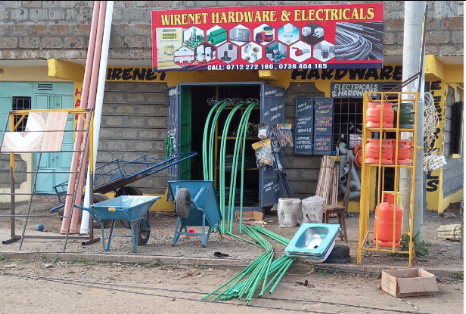Matatu Business In Kenya Explained All You Need To Know
Matatus are widely used as a mode of public transportation in Kenya, prevalent in both urban and rural areas throughout the country. Which makes the matatu business in Kenya popular.
As a result of this high demand, many Kenyans have seized the investment opportunity and ventured into the matatu industry. However, it is important to be aware of a few crucial factors before starting a matatu business in Kenya, despite its potential profitability.
The origin of the matatu business in Kenya dates back to the early 1930s when the Kenya Bus Service (KBS), formerly known as OTC, a company based in London, owned the only matatu fleet in the country.
At that time, the matatus operated as a monopoly. As the need for transport services grew, private investors began to enter the matatu business. The earliest matatu fleet comprised buses that were initially owned by KBS.
The Matatu Industry Status In Kenya
In Kenya, the transportation industry is a significant contributor to the country’s economy, accounting for approximately 10.8% of the GDP.
With over 60,000 matatus currently operating in the country, millions of Kenyans rely on this essential service every day. If you are considering investing in the matatu business, it’s crucial to understand the complexities of the Kenyan public transport sector.
One of the challenges you may face is navigating the intricacies of matatu art, which involves choosing the right designs and decorations for your vehicles. Additionally, selecting the appropriate operating route can also be a complex decision.
Furthermore, managing the cartels and police units in the industry can also be a daunting task. An example of recent industry changes is the directive from President Uhuru Kenyatta allowing matatu owners to pimp and decorate their vehicles.
As a potential investor, it’s essential to be aware of these complexities and challenges before starting your matatu business in Kenya.
“Nganya” Meaning And Why It’s Popular In Kenya
The renowned Nganyas matatus have gained fame and are commonly found in urban areas. Unlike the ordinary matatus, they come at a higher fare.
Their striking graphic designs, booming music, and added luxury services such as Wi-Fi have also made them a hit among the millennials.
However, these matatus not only charge more but are also more costly to acquire and operate due to the extra fittings and features that come at an additional expense.
Therefore, these factors and trends are essential to comprehend when venturing into this industry.
How to Start a Matatu Business in Kenya
1. Owning a Matatu
In the country, there exist different kinds of matatus that one can operate. The decision to purchase one is influenced by several factors which include the cost, capacity, and adherence to existing government regulations.
However, some individuals who are new to the business often make errors at this stage, failing in their venture.
If the price is a concern, it is possible to purchase a secondhand matatu with 14 seats or less for less than 1 million shillings.
Nevertheless, it is important to conduct a comprehensive inspection to ensure that the vehicle is in proper mechanical condition.
Matatus and mini-buses that are used for regular and long journeys tend to have a shorter lifespan compared to privately owned vehicles. To overcome this challenge, one option is to purchase a previously unused vehicle.
If you choose to buy a new 14-seater matatu, you can expect to pay an average price of 2 million shillings. For a new 33-seater mini-bus, the cost will be over 3 million shillings.
However, if you opt for larger buses, you should expect to pay an average of 10 million shillings.
It is recommended that you purchase a new matatu when starting to avoid the additional costs that come with repairing a second-hand matatu.
Popular matatu brands include Toyota, Isuzu, and Nissan due to their affordability and the easy availability of spare parts in the country.
2. Find a Reliable driver and Conductor
To ensure the success of your matatu business, it is crucial to have a reliable driver on board. If you are not able to take on the role of driver yourself, you must find someone who can fill this position.
This step is critical as the driver will play a key role in the overall success of your business by providing reliable transportation services to your customers.
When it comes to running a matatu business, having reliable and trustworthy drivers and conductors is crucial as they are responsible for car maintenance and revenue growth.
Matatu drivers and conductors are typically paid on a commission-based system, with the conductors assisting the drivers.
Under this payment plan, you will need to establish a daily target income, such as 2,000 shillings per day, but this amount may vary depending on the car’s size and condition.
The wages earned by the driver and conductor will be the net income after deducting fuel and car wash expenses.
To keep track of your matatu’s performance, you can request the driver to provide a summary of the expenses incurred over a specified period, such as monthly or weekly.
This will help you stay informed about your matatu’s status and gain a better understanding of the business model.
3. Get the Relevant licenses and Permits
To venture into the matatu business, it is necessary to fulfill several prerequisites. These prerequisites are primarily governed by the regulations for public service vehicles as established by the government, which are enforced by the National Transport and Safety Authority (NTSA).
Among the prerequisites are obtaining a valid license for public service vehicles and receiving clearance for a certificate of good conduct from the DCI.
As part of being a PSV operator, it is essential to ensure that your vehicle is covered by an insurance policy. Additionally, the NTSA will conduct a yearly inspection to confirm that your vehicle is roadworthy before issuing a valid road service license.
Furthermore, you will need to obtain a County Council Permit that permits you to operate on a particular route. The cost of this license varies depending on factors such as your vehicle’s capacity and area of operation, with an average monthly fee of between 2,000 to 3,000 shillings.
Lastly, before you can have entertainment such as music in your matatu, you will need to acquire a license from the Music Copyright Society of Kenya (MCSK).
It is crucial to adhere to these requirements as they are obligatory to prevent encountering legal disputes that may lead to penalties and imprisonment.
Related: How To Succeed In Business In Kenya
4. Branding
As a crucial aspect of Public Service Vehicles, branding plays an important role both in meeting regulatory standards and gaining a competitive edge. Matatus that are well-branded tend to earn more than those with mediocre branding.
However, achieving this level of branding requires a significant investment of resources. If a fancy matatu design is not your preference, a simple white paint coat with yellow stripes is sufficient. This basic requirement applies to all PSVs to distinguish them from privately owned vehicles.

One of the usual changes made to brand a matatu is enhancing the interior and exterior design, setting up top-notch audio and visual systems, providing comfortable seats, using LED illumination, and utilizing premium-quality seat covers.
The total cost of these modifications may vary depending on the quality and scope of the upgrades, but it usually starts at 100,000 shillings.
Therefore, it is essential to conduct a cost-benefit analysis before determining the level and range of branding that best suits your budget and objectives.
5. Sacco Registration
The Kenyan government has directed that all matatus in the country must be registered under a Sacco. This directive aims to regulate the industry in terms of route management, financial support, and accountability.
To become a member, most Saccos require the payment of subscription fees, and the amount charged may vary depending on the reputation of the specific Sacco.
Joining a Sacco also increases the level of trust that passengers have in the matatu. Reputable Saccos attract more customers due to their good track record.
Matatu owners who belong to Sacco enjoy several benefits such as care management services, collective bargaining, and access to credit facilities provided by Sacco.
Savings and Credit Cooperatives (SACCOs) play a crucial role in upholding order and enforcing guidelines, including the requirement for staff to wear uniforms and the need to maintain vehicles in good condition.
6. Start Running Your Business
Once you have met the aforementioned prerequisites, you are all set to commence your operations. It is imperative to bear in mind that the matatu business operates similarly to other ventures.
Success requires diligent effort, cost management, and adherence to regulations. Profitability can only be achieved through these means.
In addition to other essential tools, the inclusion of a GPS tracker is crucial. This allows for remote monitoring of your car in the event of incidents like theft.
Moreover, a GPS tracker aids in identifying the specific routes taken by the driver. By keeping tabs on your vehicle, you can minimize the likelihood of any potential misuse by the driver.
Read Also: How To Start A Hardware Business In Nairobi Kenya
Costs and Profit Margins in the Matatu Business
Operating costs are an inevitable part of every business model, and the matatu business is no exception. The primary expenses involved in the matatu business are fuel costs since refueling is a daily requirement.
Garage costs in the form of car repairs and servicing expenses are also significant. Traffic fines are additional costs that need to be paid whenever a matatu is involved in a traffic offense.
Some corrupt cops may demand bribes from matatu drivers, commonly referred to as “kitu kidogo.” Sacco fees and contributions vary depending on the Sacco and may include subscription or renewal fees.
Despite the various costs associated with the matatu business, it can be a profitable venture if managed correctly. The profitability of the business is determined by factors such as the route taken and vehicle capacity.
Vehicles with higher capacity tend to earn more money than those with lower capacity. On average, a 14-seater matatu can make a net income of 3,000 shillings daily, while higher-capacity vehicles can earn up to 5,000 shillings.
Recovery of investment takes at least 3-5 years.
Challenges Facing Matatu Business
1. The cartel problem
As a newcomer to the matatu industry, you’ll probably encounter well-established cartels within the sector. This problem of cartels is rooted in high unemployment levels among young people.
These cartels and gangs wield significant power and exert control over crucial aspects of the business, such as pick-up points and terminals. Refusing to comply with their demands may result in business interruptions that could lead to significant financial losses.
2. Corrupt traffic officers
The country continues to grapple with high levels of corruption among law enforcement officials, according to multiple reports.
This leads to a rise in operating expenses due to the need to offer bribes. Moreover, these dishonest enforcers are also responsible for the surge in the number of accidents as they allow unroadworthy vehicles to ply the roads of Kenya.
3. Theft of the matatu
Car theft is an ever-present danger that can lead to significant financial losses. If you don’t have comprehensive insurance coverage, the loss of your vehicle can result in both the loss of the car and your income.
To prevent this, one effective approach is to install a GPS tracker on your car, conduct proper research before hiring staff, and make sure that your car has adequate insurance coverage.
These measures can help to reduce the risk of theft and increase the chances of recovering your vehicle if theft does occur.
4. Customer challenges
As the proprietor of a matatu, you are bound to interact with a vast array of patrons, all of whom possess unique traits. Every so often, you may come across a challenging customer who is either impolite or disorderly and declines to pay their fare.
In some instances, they may also inflict harm upon your vehicle, resulting in additional expenses. When a patron refuses to pay, it not only puts your business at risk of financial loss but also increases your operational expenses when faced with damages.
Final Thoughts on Matatu Business In Kenya
The matatu industry has been changing over the years. If you are considering entering the matatu business, it is crucial to conduct thorough research from both industry insiders and external sources.
It is important to keep in mind that starting a matatu business requires a substantial amount of capital compared to other business ideas in Kenya. However, during peak seasons, the profit margins can also be significant.
Another advantage of the matatu business is that it has a readily available market as transportation is a basic need.
Read Also:







